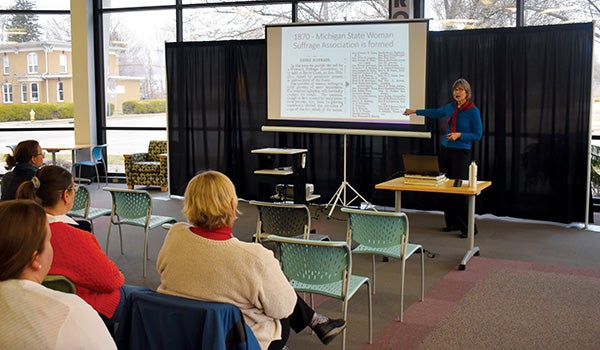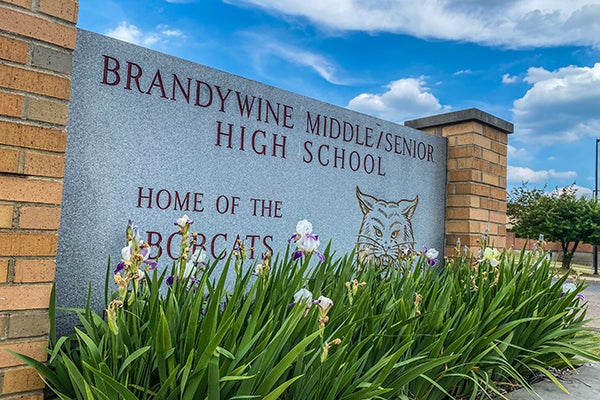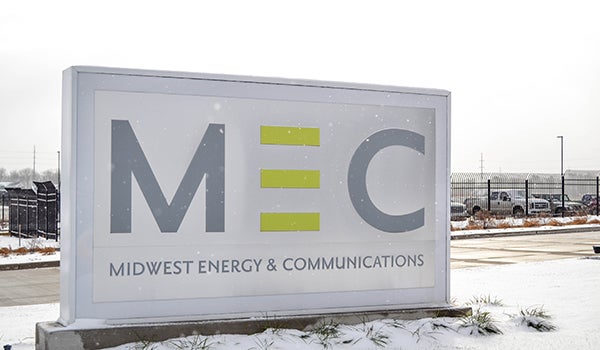Niles History Center program discusses local impact of suffragist movement
Published 8:44 am Saturday, March 14, 2020
NILES — A small audience gathered Thursday night to listen to guest speaker Ruth Stevens give her talk “Getting the Vote: Michigan Women and the Path to Suffrage.”
The event was hosted at the Niles District Library in partnership with the Niles History Center. The audience of predominantly women attended, eager to learn more about their local history, and gain a deeper understanding of the suffrage movement.
Michigan was one of the first states in the U.S. to grant women full voting rights by 1918. The 19th Amendment ratifying women’s rights to vote celebrates its 100th anniversary later this year.
Amid concerns of the news of events being canceled through the day due to the COVID-19 coronavirus, audience members left space between one another and waved instead of shaking hands.
Andrea Burns, adult services programming manager for the Niles District Library, reminded everyone of basic health precautions at the start of the event.
Stevens began her hour-long presentation by reaching back into history to 1837, when Michigan gained its statehood. Even then, conversations about who could vote, and what that meant for people, were being discussed.
She navigated through Michigan’s suffrage history, weaving early efforts by women in Sturgis for school board votes, to Sojourner Truth’s attempt to vote at the age of 90 in Battle Creek. She highlighted that while Truth was denied her vote that day in 1872, a woman in Gadsden, Alabama, was allowed to cast a vote for herself.
Truth was not the only nationally recognizable suffragist mentioned in Stevens’ presentation. Susan B. Anthony spent six weeks in Michigan, including a stop in Niles, speaking with those who were interested — or skeptical — of women voting.
Stevens had found entries in one of Anthony’s journals from her stops in Niles, where she stayed at the Niles-Peaks Hall-Reading Hotel.
“Levi Sparks, a farmer living four miles out, arranged my meeting — large audience again and not a single no — scores of women came forward at close of lecture to shake hands and thank me for my truthful words. But not a mortal man or woman of the city had called me at hotel, only Mr. and Mrs. Sparks. Dr. Bodine a friend of Mr. S but did not come to speak to me,” read one of the entries.
Local historians were familiar with names mentioned in the entry.
Stevens also highlighted artist and activist Lottie Wilson Jackson, who lived much of her life in Niles. Jackson worked with efforts up to the national level in both suffrage and civil rights activism.
Highlighting some of the pushback to women gaining the right to vote as well, Stevens shared a quote from the Grand Rapids Press from March 15, 1910, of Edward L. Hamilton, of Niles’ fourth district.
“I am in favor of woman’s suffrage whenever a majority of women want to vote,” Hamilton was quoted.
There was a short discussion following the event. Audience member Eugenia Apawu thanked Stevens for the deeper dive into the local suffrage history.
“You don’t see this local history when you Google the movement,” Apawu said.
Stevens replied that finding localized history can be difficult to track down, but she had learned quite a bit herself.
“I started by researching the legal aspect of the suffragist movement,” Stevens said. “I’m an attorney by training, and I taught women’s studies. The Women’s History Council in Grand Rapids was invited to present in Sturgis at a state history conference. We were given the topic of suffragists in southwest Michigan. That had me diving into what we had here, and it helped broaden my interest into the whole movement.”
Stevens, a retired professor of legal studies at Grand Valley State University, has a background that includes earning a J.D. from the University of Michigan and her master’s degree in library and information science from Wayne State University.







